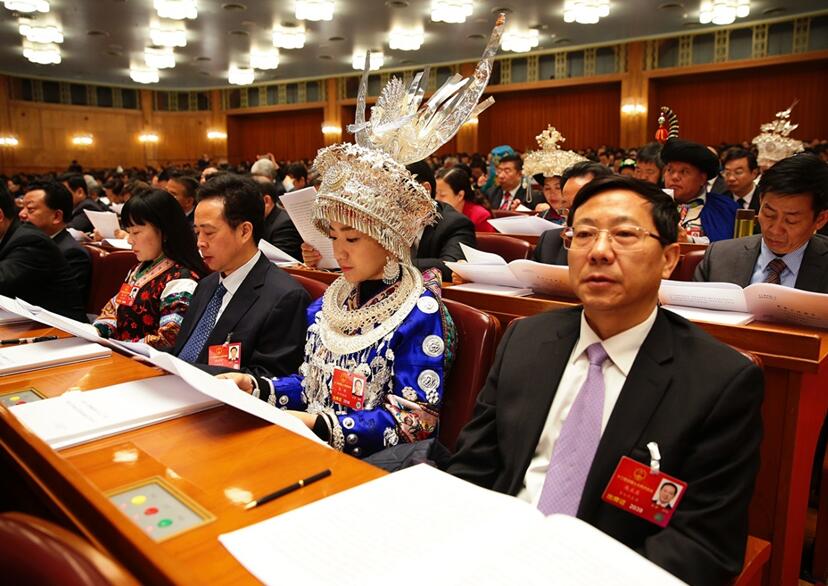China sailing to prosperity with new policies
 0 Comment(s)
0 Comment(s) Print
Print E-mail China.org.cn, March 31, 2016
E-mail China.org.cn, March 31, 2016
As China ended its political high season on March 16 with the approval of the government work report and, along with other bills, a new five-year plan, the country is now looking at historic opportunities that will bring concrete benefits to its citizens and the world beyond.
 |
|
The 4th session of the 12th National People's Congress opens at the Great Hall of the People in Beijing on March 5. |
New momentum boosts economy
As the global economy remains sluggish, the world is concerned about China's performance. At the opening meeting of the fourth session of the 12th National People's Congress (NPC), Chinese Premier Li Keqiang expressed his confidence in the Chinese economy in a government work report that sets this year's economic growth target at between 6.5 and 7 percent and the average annual growth rate over the next five years at above 6.5 percent.
"As long as we stay on the course of reform and opening up, China's economy will not suffer a hard landing," Li told a press conference after the close of the NPC session.
China has initiated the concept of "new economy" to foster new growth drivers for overall economic transformation. It is not just about emerging forms of businesses and industries, such as e-commerce, cloud computing, and the Internet of Things. It is also found in smart manufacturing, large-scale customized production, family farms, and share-holding cooperatives in agriculture, said Li. The new growth drivers will generate new jobs, which will in turn help with larger efforts to cut overcapacity, he added.
The supply-side structural reforms China has been pursuing - including streamlining administration, delegating government powers, and cutting corporate taxes - are designed to unleash more market vitality, he said.
Li also pointed out that urbanization represents the largest source of China's domestic demand and that the campaign of mass entrepreneurship and innovation will generate powerful momentum to tackle downward economic pressure.
"Propelled by new growth drivers and upgraded traditional ones, China's economy will be able to get through difficulties and rise to a more promising level," he stated.
"China has potential to grow 2-3 times faster than major advanced economies, as long as market-oriented structural reforms prevail. And that is growth by fundamentals," analyzed Dan Steinbock, a global economic and policy analyst and a columnist with China.org.cn
New plan charts development course
The 13th Five-Year Plan adopted at the NPC session outlines the policy framework, priorities, and economic and social goals for 2016-2020, including an average annual growth rate of more than 6.5 percent. Meeting the targets will be crucial to realizing the goal of building a "moderately prosperous society in all aspects" by 2020, when the country's GDP and per capita personal income should be twice as high as their 2010 levels.
To this end, China vows to continue the reform and opening up drive, to push ahead with urbanization and agricultural modernization, to coordinate development in urban and rural areas, and to improve people's well-being across the board, so that everyone has a share in the fruits of development.
The blueprint, which is called China's "greenest" five-year plan, places heavy emphasis on green development, with 10 out of 25 priority targets related to environmental protection.
According to the plan, an innovation-driven development strategy should be implemented and major progress should be made on the China-proposed Belt and Road Initiative.
"Coming at a time when the global economy is struggling to recover, the 13th Five-Year Plan has done well to dwell on various possibilities, balancing between growth and the environment, a trade-off between prosperity and redistribution, and building bridges between the old and the new paradigm of growth," noted Niranjan Sahoo, a senior fellow at the Observer Research Foundation in New Delhi.
New charity law supports poverty relief efforts
While people talk about the progress China has made in human rights protection and its budget cuts in defense spending, another highlight that garnered much attention is the adoption of the country's first charity law.
The new law, which will take effect in September, eases restrictions on the fundraising and operational activities of charity groups and promises tax benefits for the sector. It will also tighten supervision on charity organizations’ internal management.
China expects the new law to encourage more ordinary citizens, enterprises, and social organizations to engage in charity programs, and to provide strong support for the ongoing poverty alleviation campaign, which is faced with the pressing goal of lifting all rural residents above the poverty line by 2020.
"China's new charity law establishes a concept of 'big philanthropy' and provides a broad definition of 'charity.'…This illustrates that philanthropy in China has expanded from only solving problems of survival to promoting China's comprehensive development," wrote Eugene Clark, Dean of the Sydney City School of Law.
Commenting on the country's ambitions, Clark is optimistic. "While there are significant challenges ahead, when one considers what has been achieved over the last two decades, the world should remain confident that the Chinese people and their political, economic, and social systems are up to the task."
Infographic: Gov't work report in 2016
Don't miss:












Go to Forum >>0 Comment(s)